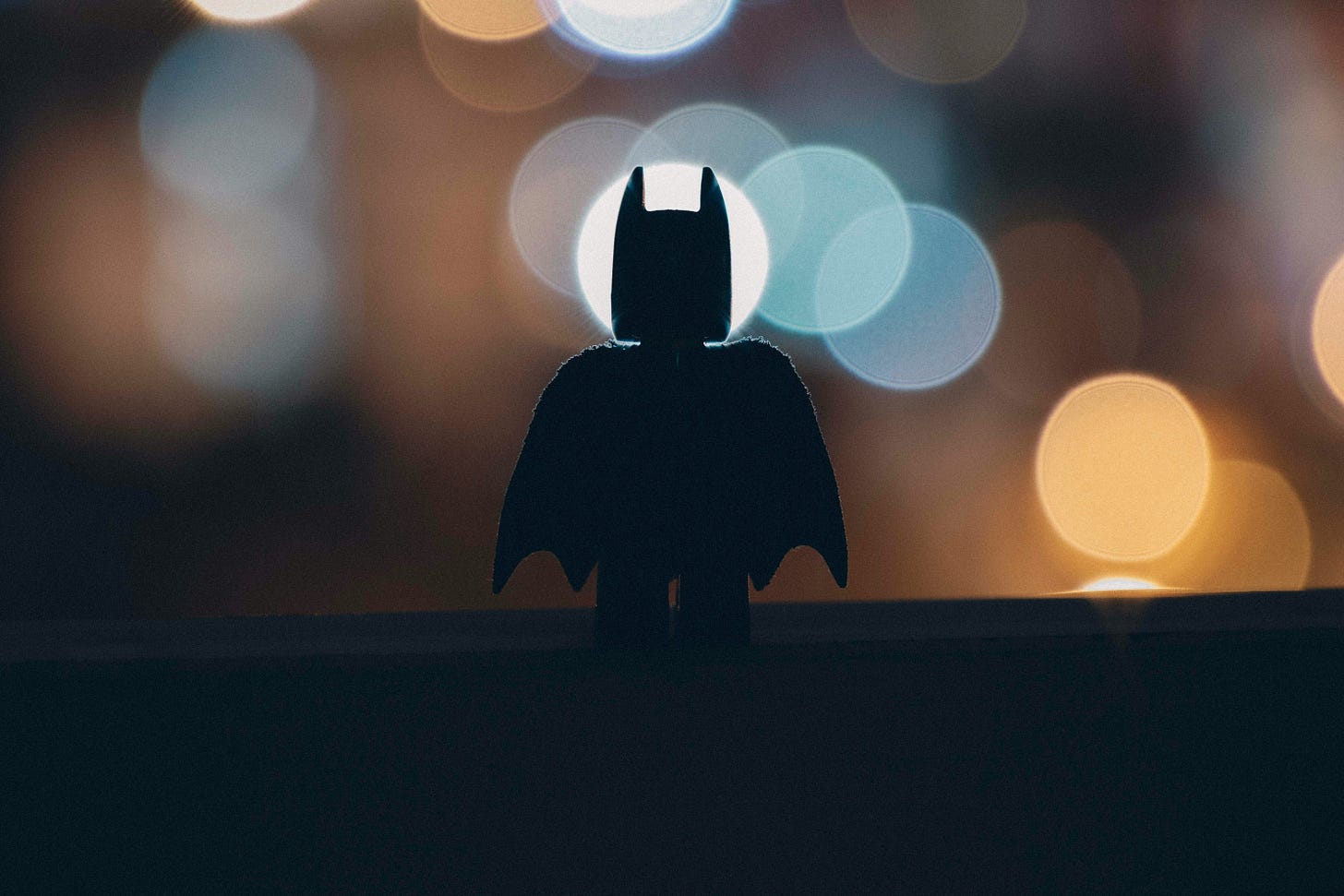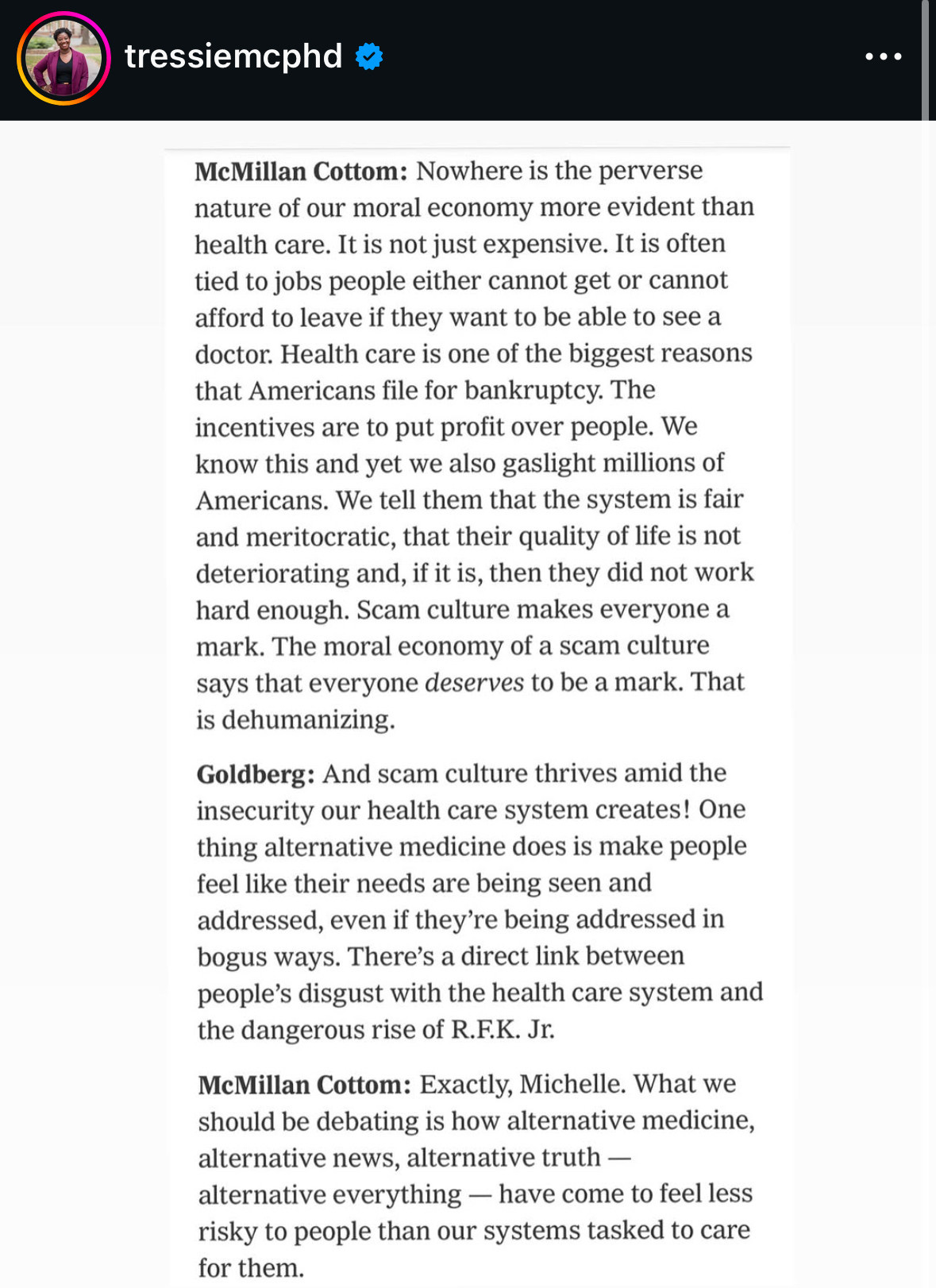What We Talk About When We Talk About Vigilantes
*Batman voice* I am dressed like a large bat instead of going to trauma-informed therapy please admire me. Alfred: Very good sir.

In the incredibly cheesy holiday romance book I’m currently listening to (The Christmas Wish) the grandmother says her wish would be to do away with The Internet because there is simply Too Much Of It. It’s true that maybe it was a mistake to gain access to all of Flava Flav’s unfiltered thoughts (jk, this is incredible), but was it truly better when Cronkite was our national sieve, or do important things bubble up out of the endless supply of dank memes, shitposts, and people on Nextdoor terrified of anyone even a little tan who is wearing a hoodie?
I am not a free speech absolutist; I do believe in the “clear and present danger” argument re: the First Amendment (e.g., do not yell “FIRE!” in a crowded theater). It can be incredibly difficult to navigate the line between someone pushing free speech boundaries in a way that’s healthy — often seen in comedy — and someone using the guise of free speech or comedy (“I was just joking!”) to intimidate vulnerable groups or engage in outright hate speech. Is something satire, meant to be challenging and thought-provoking? Or is someone an edgelord with a platform they want to use as a bully pulpit?
One woman’s trash is another man’s treasure, etc.
It feels pretty obvious to me when there’s no real punchline — just a dude on a stage who wants the permission of performance to say slurs !!! (But what do I know? I am but a humble woman who wrote an entire master’s thesis on disaster humor.)
Good satire helps illuminate issues. Dark humor is a noted adaptive coping mechanism. These things are especially salient in light of the conversation emerging in the wake of the killing of an insurance CEO.
We need to talk about Kevin (Kevin is gun violence in America)
The latest charges in this case reframe the conversation — this was not only an act of extrajudicial execution, but terrorism. It was an act meant to inflict terror.
When is murder not meant to inflict terror? On which populations will we tolerate terror being inflicted — regularly, routinely? We are somehow okay sending our nation’s children to school with bulletproof backpacks, parents memorizing which shoes they’re wearing because that might be the only easily identifiable thing in the wake of the carnage inflicted by a weapon that leaves exit wounds the size of an orange.
The school shooting this week in Madison is just one of the 971 cases of school shootings nationally this year, 112 involving a victim who was injured or killed. The thing that struck me the most about a disaffected young man in America reaching for the tool he has been taught since birth is a mark of power, control, and masculinity— a gun — is that he didn’t use it to shoot up a school, a mall, a concert, a church, or a movie theater.
He used it to inflict terror on the wealthy elite.
The emerging conversation holding him up as a kind of folk hero isn’t because everyone loves murder and wants to replace Christmas with The Purge1. Sure, there are some sick freaks out there who do. But the average person posting memes about how he should have gone to Waffle House is doing that because they are angry. Angry because they have a story about a time the healthcare system failed them or someone they love. Angry because we do nothing while our children bleed out at school and our neighbors are maimed in other public arenas, but jump into action the first time a person with a net worth of $43 million dollars is perceived as being held to account — rightly or wrongly.
This can be seen as an act of class warfare, which Tressie McMillan Cottom explains in a discussion with two other NYT Opinion columnists.
The conversation we should be having is how to fix these systems so no one feels they have a justified reason to shoot a man to death in the early morning before an investor conference. When you read the stories people share about the ways the healthcare system has failed them, it’s surprising more of them decide to heal themselves with crystals rather than become The Joker.
The Grapes of Wrath make for bitter wine
An often misquoted line from Steinbeck highlights an important thing about Americans and how “the poor see themselves not as an exploited proletariat, but as temporarily embarrassed millionaires."
The Grapes of Wrath was written in the wake of The Great Depression, a time when the wealthy elite flaunted their fortunes while families starved. As wealth inequality in America deepens, it’s good practice to remember that you are much closer to any person living on the street than you are to a big pile of rice all your own.
 Tiktok failed to load.
Tiktok failed to load.Enable 3rd party cookies or use another browser
As a nation, America has the most expensive healthcare and ranks last compared to similar countries “on measures of quality, efficiency, access to care, equity, and the ability to lead long, healthy, and productive lives”. As a freelancer, I have firsthand experience with the nightmare that is the American healthcare system outside of A Job: my pets both have more affordable, comprehensive health insurance coverage than I do.
The moral reckoning we all need to have is this: if you view this act as not only murder but as terrorism, do you view the actions of Kyle Rittenhouse or Daniel Penny the same way? When is it justified to take the life of someone else because you are scared? Should Dylan Roof, who walked into a church and murdered nine people in the explicitly stated hope of starting a race war, have been charged with terrorism?
Who should be held accountable for structural violence, and in what way?

Some forms of violence are easy to identify: using force against someone, with a weapon, or through your own strength. We know that as violence.
It’s almost invisible when it’s baked into the system and culture, especially if we mostly benefit from the system and culture. We do not call it violence when pipes are left full of lead in a poor neighborhood we’ve never been to. We do not call it violence when thousands of people lack adequate access to resources like education or healthcare; when they have no political power or legal standing.
These things still leave thousands dead over time, at best shaving years from lives. But because it does not involve one person doing a specific action to another in a way we can directly see, it is hard for us to classify it as violence.
After all, that will never happen to us, right? We work hard. We follow the rules. We are Good. We have to believe that, or the system fails.
The system as it functions right now benefits the people with the biggest piles of rice, and it’s in their best interest that you never ask these questions in the first place — just keep believing if you work hard enough, you’ll be one of them.
Odds are, you won’t. Becoming a vigilante will not fix the system, either, especially if it results in drowning out the conversations we should be having with more virtue signaling and culture wars.
It all feels impossible, but then so did the divine right of kings.
Get Rec’d
What I’m reading, watching, being haunted by.
What I’m reading: The next book club pick is Blood Over Bright Haven by M.L. Wang, which I have no feelings about yet because I have not started it!
What I’m watching: This Christmas Eve, I will once again be watching A Muppet Christmas Carol because it is a perfect and beautiful film.
Reality: Finally, the true spirit of Christmas!!!
Escapism: Reverse Centaur.
Wildcard: “A struggle against illness is a fight that can be won; a struggle against old age is an attempt to defy time itself. For Meyers, Arthur represents a world she loves that she’s worried is dying. Preemptive grief is a powerful feeling.” The Holiday is about death!
Until next time.
Call me Hollywood, I’ll start workshopping The Purge: War on Christmas immediately






